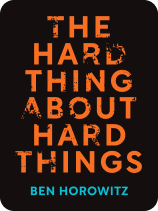

This article is an excerpt from the Shortform book guide to "The Hard Thing About Hard Things" by Ben Horowitz. Shortform has the world's best summaries and analyses of books you should be reading.
Like this article? Sign up for a free trial here .
How do you know when it’s time to start building an official process at your company? How can well-defined processes help minimize company politics?
When adding new employees feels harder than adding more work to your current employees and it’s hindering growth, it’s time to build processes. Processes may seem tedious, but without processes, workplace politics develop and make it a bad place to work.
Continue on to learn how to build a company process.
How to Scale With Processes
When you have only five people, you don’t need processes. Everyone communicates with each other by talking across a table, and decisions are made quickly. There is no politics because everyone can hear each other.
When your company grows, these problems become exponentially more difficult. You will need to build a company process to keep people communicating, making good decisions, and sharing knowledge.
How do you know it’s the right time to build in processes? When adding on a new employee feels harder than adding more work to your existing employees; and when this feeling is preventing you from growing the team quickly enough to reach the company’s goals.
How to Build a Process, Generally
Here are the main principles of designing a good process:
- Define your ultimate goal. In product development, the ultimate goal may be customer satisfaction, not number of features. In hiring, the ultimate goal is the number of productive employees you gain, not the number of interviews you run.
- Define the steps that lead to the ultimate goal. In hiring, the steps involve sourcing candidates, filtering candidates, interviewing, giving job offers, onboarding and training them, and retaining them.
- Measure how each step is performing. You should be able to see which step is underperforming.
- Assign accountability to each step. Someone should be responsible for each step’s performance.
For more on this, Ben recommends reading Andy Grove’s High Output Management.
Minimizing Politics With a Company Process
In an ideal startup environment, people are rewarded based on merit, on their productivity and contributions. In contrast, politics rules when people get ahead on grounds other than merit. Someone might get promoted because of a personal relationship with the boss; someone might get a raise she didn’t deserve because she’s more aggressive about asking.
When people get ahead with politics, it becomes a bad place to work. The people who don’t play politics resent the people who do and the managers who fall for it. Even worse, they start emulating the political behavior because it works.
How does a well-meaning company eventually get polluted by politics? It starts at the top. Even if the CEO is not political, if she doesn’t enforce disciplined processes around how the team is compensated and promoted, people will be incentivized to play politics.
The general solution to politics is 1) to hire people with the right kind of ambition (as we covered in the last chapter, and 2) to build good processes around important decisions. If the structured process is followed religiously, people will know the way to get ahead is to do well in the process.
Another tactic is to maintain your composure when someone brings something controversial to you, like a complaint about another employee or a competing job offer. Don’t react impulsively and try to make the person feel better right away; stay firm in handling it as part of your usual process. Anything you say here can be used against you when it turns into gossip.

———End of Preview———
Like what you just read? Read the rest of the world's best book summary and analysis of Ben Horowitz's "The Hard Thing About Hard Things" at Shortform .
Here's what you'll find in our full The Hard Thing About Hard Things summary :
- What it was like to head a company through the dotcom bubble and subsequent burst
- Why failing is normal
- How to build a good place to work






